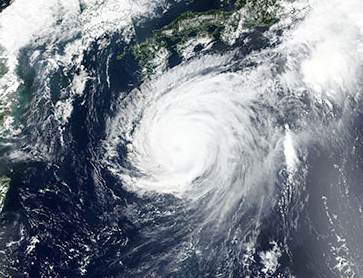Results announced this morning by global reinsurance firm SCOR confirm the loss creep trend we’re expecting to see from Japanese typhoons Jebi and Trami, as the company revealed a EUR 53 million hit to profits.
 Yesterday, Bermudian insurance and reinsurance firm AXIS Capital revealed a $30 million Japan typhoon loss creep hit, as reported by our sister publication Reinsurance News.
Yesterday, Bermudian insurance and reinsurance firm AXIS Capital revealed a $30 million Japan typhoon loss creep hit, as reported by our sister publication Reinsurance News.
Now, SCOR has demonstrated just how impactful the loss creep could be, as the additional EUR 53 million of pre-tax loss creep has resulted in its first-quarter 2019 net income coming out over 21% below the prior year periods.
SCOR reported net income of EUR 131 million for Q1 2019, well below the EUR 166 million delivered in the prior year quarter.
But the reinsurance firm explained that this year’s after tax profits would have been much higher at EUR 169 million, if the loss creep from Japanese typhoons Jebi and Trami had not hit the firm.
Industry loss estimates for the typhoons have more than doubled since the time of the storms and in the case of typhoon Jebi stand three times higher than the initial estimates that risk modelling firms produced.
There are numerous reasons for this, the complexity of the losses, the wide area affected, the fact Japan had been so plagued by rainfall and flooding, and the fact the olympics preparations meant further perhaps less expected loss impacts and business interruption claims.
With the end-result being a significant creep in the losses from the typhoons, which it appears is set to be one of the major trends of the reinsurance results season now upon us.
SCOR’s results were otherwise very positive it seems, as reported here earlier this morning over on Reinsurance News.
Premiums grew roughly 6% across its business in Q1 2019, but were up a huge 16% in the P&C business, as it continued its expansion back into the United States on the back of higher rates.
Return on equity was reported as 9% for the quarter annualised, which is down 2.2 points on the prior year but this is largely due to the typhoon loss creep as well.
Commenting on the results, Denis Kessler, Chairman & Chief Executive Officer of SCOR, said, “The strong start to 2019 bears witness to the depth of SCOR’s franchise and the relevance of the Group’s strategy. The Group’s technical profitability is highly satisfactory, as demonstrated respectively by the P&C combined ratio and the Life technical margin. Both the solvency ratio and the ROE are in line with the targets of the plan. SCOR continues to create long-term value and provides its shareholders with attractive returns, raising the dividend per share to EUR 1.75 subject to approval by today’s Annual General Meeting.”
Overall, SCOR appears set to achieve attractive profits in 2019, if the market remains free of too many major losses and catastrophes, with its much enlarged book written at higher pricing a sign that the overall profitability in reinsurance has clearly improved in 2019.
But this Japanese typhoon loss creep trend is one that is set to hurt many companies, in this Q1 2019 results season.
Analysts at Buckingham Research said yesterday that they expect companies such as RenaissanceRe, Everest Re and AIG, to all report some loss creep. That’s just the companies within the analysts coverage.
But the amount of loss creep suffered is set to be wide-ranging, as some companies had set their initial reserves based on higher industry loss estimates than others.
It’s also likely we’ll see loss reserves hardened by the other major reinsurance firms that have a decent market share in Japan, so Swiss Re and Munich Re for certain, possibly Hannover Re as well.
Other insurance and reinsurance players, across the Bermudians, Lloyd’s players, other international firms, are all likely to experience some hardening of their Japanese typhoon loss reserves, which will be reported with their results.
As we’ve seen in the insurance-linked securities (ILS) space, where funds and collateralised underwriters have been adding to side pockets and reserves with each increase in industry loss expectations for these storms.
The loss creep trend confirmed, we now wait to see who takes the biggest share. Swiss Re could be an outlier, given its significant market share in Japan in reinsurance and commercial lines, as well as AIG which will have loss creep through its primary book as well as through the Validus reinsurance book it now owns.
———–
 Register today to attend our next ILS conference in Singapore, ILS Asia 2019.
Register today to attend our next ILS conference in Singapore, ILS Asia 2019.
We’re returning to Singapore for our fourth annual ILS market conference for the Asia region. Please register today to secure the best prices. Early bird tickets are still on sale.
 View all of our Artemis Live video interviews and subscribe to our podcast.
View all of our Artemis Live video interviews and subscribe to our podcast.
All of our Artemis Live insurance-linked securities (ILS), catastrophe bonds and reinsurance video content and video interviews can be accessed online.
Our Artemis Live podcast can be subscribed to using the typical podcast services providers, including Apple, Google, Spotify and more.






























